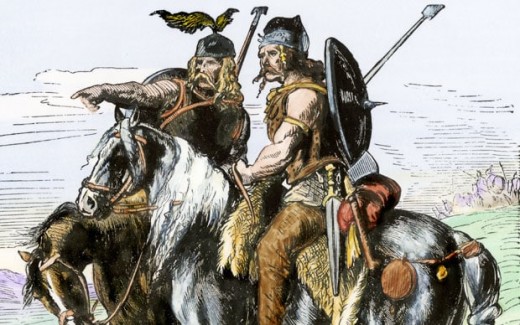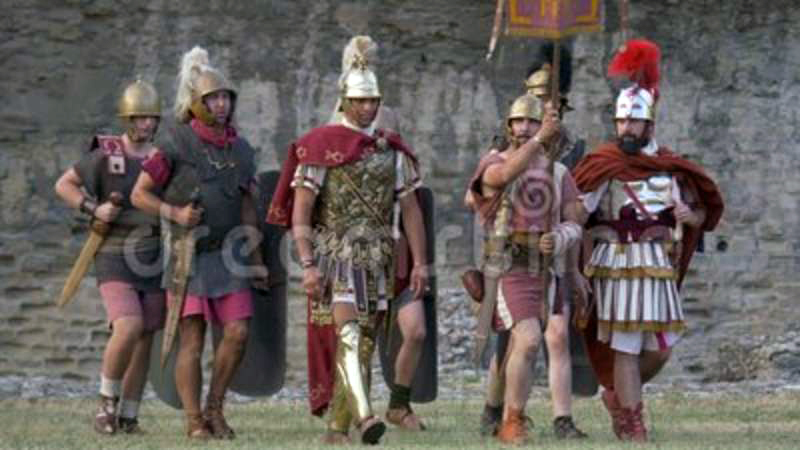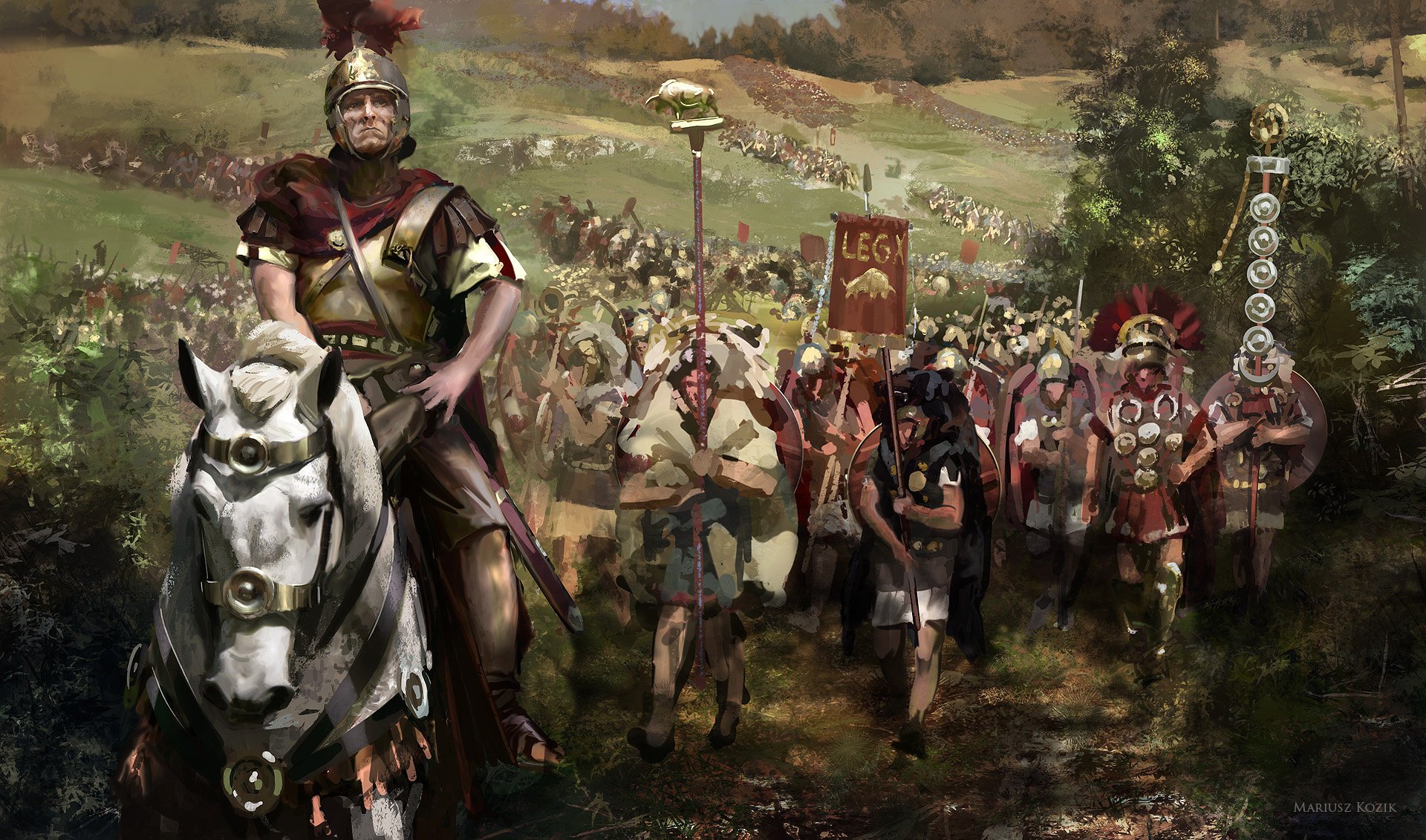At dawn on the first of December I left Milan for Gaul. I said farewell to Helena, who was to join me later at Vienne. We both behaved according to the special protocol the eunuchs have devised governing a Caesar’s farewell to his new wife as he goes to a beleaguered province. Then, accompanied by the newly arrived Oribasius, I went down to the courtyard of the palace to place myself at the head of my army.
Outside in the frosty air, some three hundred foot soldiers and a score of cavalry were drawn up. I took this to be my personal bodyguard. I was about to ask the whereabouts of the army of Gaul when I was joined by Eutherius. He was frowning. “I’ve just spoken to the Grand Chamberlain. There has been a last-minute change in plans. Your legions have been assigned to the Danube.”
I indicated the men in the courtyard. “Is this my army?”
“I am afraid so, Caesar.”
I have never in my life been so angry. Only the arrival of Constantius prevented me from saying the unsayable. I saluted the Emperor; gravely, he returned the salute. Then he mounted a black horse and I mounted a white one. His personal guard (twice the size of my “army”) fell into place behind him. My troops and household brought up the rear. Thus the Augustus and his Caesar launched the power of Rome against the barbarians. It was ludicrous.
The few citizens who were up and around at this hour cheered us dutifully. We made a particularly fine impression at the vegetable market which is just inside the city gate. The farm women waved their carrots and turnips at us, and thought us a brave sight.
Neither Constantius nor I spoke until we were out on the main road, the high Alps visible to us across the Lombard Plain. He had agreed to escort me as far as the two columns which stand on either side of the road midway between Lumello and Pavia. He had obviously decided this would give us sufficient time for a good talk. It did.
Constantius began with, “We have great confidence in Florentius, our praetorian prefect at Gaul.” This was an announcement; there was no invitation for me to comment.
Of course he has confidence in Florentius, I thought savagely, otherwise he would have had him murdered by now. But I said, “Yes, Augustus.” And waited. We rode a few more yards. Occasionally, our armoured legs touched, metal striking metal, and each would shrink instinctively from the other. The touch of another man has always disturbed me; the touch of my father’s murderer alarmed me.
We passed a number of carts containing poultry; they had pulled off the road at our approach. When the peasants saw the Emperor, they fell fiat on their bellies, as though blinded by the sight of that sacred figure. Constantius ignored them.
“We are fond of our sister Helena.” This was also launched upon the dry cool air in an oracular tone.
“She is dear to me, too, Augustus,” I replied. I was afraid he was going to lecture me on my marital duties, but he made no further mention of Helena.
Constantius was constructing a case. His occasional fiat sentences, suitable for carving in marble, were all part of an edifice created to contain me. I was to obey the praetorian prefect of Gaul, even though as Caesar I was his superior. I was to remember that Helena’s first loyalty was to her brother and ruler, not to her husbafid. So far, I understood him clearly.
“We have heard from your military instructor that you show promise.”
“I shall not fail you, Augustus. But it was my understanding that I was to go to Gaul with an army, not an escort.”
Constantius ignored this. “You have come to soldiering late. I hope you are able to learn what you will need to know.”
This was not optimistic, but not unnatural. There was no reason for anyone to suspect that a philosophy student should show any talent for war. Curiously enough, I had every confidence in myself because I knew that the gods would not desert me now they had raised me up. But my cousin had no way of knowing my feelings, or judging my capacity. He merely saw a young untried soldier about to go into battle against the fiercest fighters in the world.
“At all times remember that we are divine in the eyes of the people and sacred to heaven.”
I took the “we” to mean Constantius and myself, though he may have been merely reminding me of his own rank. “I shall remember, Augustus.” I always called him by his proper title, though he much preferred Lord, a title I despise and do not use for it means that one is the master of other men, rather than simply first among them.
“Control your generals.” Though he still sounded as if he were repeating maxims, I could tell that now he was on the verge of actual advice, if not conversation. “No officer should be admitted to senatorial rank. All officers must be under strict civilian control. Any governor of any province outranks any general sent to him. No officer must be allowed to take part in civil affairs. Our praetorian prefects are set over all military and civil officials. That is why the administration of the empire runs as smoothly as it does.”
Needless to say, I did not remark that the collapse of Gaul was hardly a sign of smooth administration. But in principle Constantius’s advice was good and I tend still to follow it. There is no denying that he had a gift for administration.
“In matters of taxes, take whatever is owing us. Show no mercy to the cities and villages which are delinquent in meeting payments. It is their nature to complain. Assume that your tax gatherers are honest unless proved otherwise. They are never honest, but no one has yet found a way to correct their abuses. As long as they return to you the larger part of what they collect, be satisfied.”
I was later to revise the system of taxation in Gaul, disproving everything he said. But all that in its proper place.
“Control the generals.” He repeated this suddenly as if he’d forgotten he had already said it to me. Then he turned and looked at me for the first time that day. It was startling. No longer was he the sun god on his charger. This was my cousin, my enemy, my lord, source of my greatness and potential source of my death. “You must know what I mean,” he said, sounding like a man, not an oracle. “You have seen the state disrupted. Our high place threatened. Provinces wrecked. Cities destroyed. Armies wasted. The barbarians seizing our lands, because we were too busy fighting one another to protect ourselves from the true enemy. Well, Caesar, remember this: allow no general sufficient power to raise an army against you. You have seen what I have had to suffer. Usurper after usurper has wasted our power. Be on your guard.”
“I will, Augustus.”
Then he said, very slowly, his eyes on mine, “As I am on my guard.” He looked away when he saw that his meaning was quite clear. Then he added for good measure, “We have never yet lost so much as a foot of earth to any usurper, nor will we ever.”
“As long as I live, Augustus, you shall have at least one arm to fight for you.”
We rode until midday. Then at the two columns we stopped. It was a fine brisk noon and, despite the chill in the air, the sun was hot and we were all sweating under our armour. A halt was ordered.
Constantius and I dismounted and he motioned for me to accompany him into a hard stubbled field. Except for our troops, no one was in sight. In every country peasants vanish when they see armed men coming: all soldiers are the enemy. I wish one could change that.
Constantius walked ahead of me towards a small ruined shrine to Hermes which stood at the edge of the field (a favourable omen, Hermes has always watched over me). Behind us, our men watered horses, rearranged armour, swore and chattered, pleased by the good weather. Just as Constantius entered the shrine, I broke a dead flower off its stalk. Then I followed him inside the shrine, which smelled of human excrement. Constantius was urinating on the floor. Even in this, he was grave and majestic.
“It is a pity,” I heard myself saying, aware as I spoke that I was breaking protocol, “what has happened to these old temples.”
“A pity? They should all be torn down.” He rearranged his clothes. “I hate the sight of them.”
“Of course,” I muttered.
“I shall leave you here,” he said. We stood facing one another. Though I deliberately stooped, I could not help but look down on him. He edged away from me, instinctively searching for higher ground.
“Whatever you need, you shall have. Call on me. Also, depend on our praetorian prefect. He represents us. You will find the legions of Vienne alert, ready for a spring campaign. So prepare yourself.”
He handed me a thick document. “Instructions. To be read at your leisure.” He paused. Then he remembered something. “The Empress has made you a gift. It is with your baggage. A library, I believe.”
I was effusive in my gratitude. I said words but Constantius did not listen. He moved to the door. He paused; he turned; he tried to speak to me. I blushed. I wanted to reach out and take his hand and tell him not to fear me, but I did not dare. Neither of us was ever able to face the other.
When Constantius finally spoke, his voice broke with tension. “If this should come to you…” Awkwardly he gestured at himself to indicate the principate of the world. “Remember…” Then his voice stopped as if a strangler’s thumb had blocked the windpipe. He could not go on. Words had failed him again, and me.
I have often wondered what it was he meant to say; what it was I should remember. That life is short? Dominion bitter? No. Constantius was not a profound man. I doubt if he had been about to offer me any startling insight. But as I think back on that scene in the ruined shrine (and I think of it often, I even dream of it), I suspect that all he meant to say was, “Remember me.” If that is what you meant, cousin, then I have, in every sense, remembered you.
Constantius left the shrine. As soon as his back was to me, I placed the withered flower on the profaned floor and whispered a quick prayer to Hermes. Then I followed the Emperor across the field to the road.
Once mounted, we exchanged formal farewells, and Constantius rode back to Milan, the dragon banner streaming in the cool wind before him. We never saw one another again.
 But despite their beauty, they are remarkably quarrelsome. Both men and women speak with curiously loud voices, braying their vowels and sounding hard their consonants. Whenever I gave justice, I used to be deafened by the rival lawyers and claimants, all bellowing like wounded bulls.
But despite their beauty, they are remarkably quarrelsome. Both men and women speak with curiously loud voices, braying their vowels and sounding hard their consonants. Whenever I gave justice, I used to be deafened by the rival lawyers and claimants, all bellowing like wounded bulls.








